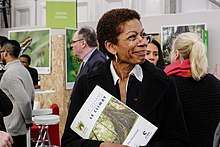George Pau-Langevin
George Pau-Langevin (born 19 October 1948 in Pointe-à-Pitre, Guadeloupe) is a French politician, member of the National Assembly and former Minister.
George Pau-Langevin | |
|---|---|
.jpg) George Pau-Langevin in 2013 | |
| Member of the National Assembly for Paris's 15th constituency | |
| Assumed office 1 October 2016 | |
| Preceded by | Fanélie Carrey-Conte |
| In office 20 June 2012 – 21 July 2012 | |
| Preceded by | Constituency created |
| Succeeded by | Fanélie Carrey-Conte |
| Minister of Overseas Territories | |
| In office 1 April 2014 – 30 August 2016 | |
| President | François Hollande |
| Prime Minister | Manuel Valls |
| Preceded by | Victorin Lurel |
| Succeeded by | Ericka Bareigts |
| Junior Minister for Educational Success | |
| In office 1 April 2014 – 30 August 2016 | |
| President | François Hollande |
| Prime Minister | Jean-Marc Ayrault |
| Member of the National Assembly for Paris's 21th constituency | |
| In office 19 June 2007 – 19 June 2012 | |
| Preceded by | Michel Charzat |
| Succeeded by | Constituency removed |
| Member of the Regional council of Île-de-France | |
| In office 23 March 1992 – 15 March 1998 | |
| Personal details | |
| Born | 19 October 1948 Pointe-à-Pitre, Guadeloupe |
| Nationality | French |
| Political party | Socialist Party |
| Alma mater | University of Paris |
| Profession | Lawyer |
Early life and education

George Pau-Langevin was president of the Movement against racism and for friendship between peoples from 1984 to 1987 [1]. In 1989, she joined the National Agency for the Promotion and Integration of Workers from Overseas as Deputy Director. mer (ANT), which she directed from 1997 to 2001.
She was decorated with the Legion of Honour in March 2002 [2].
Political career
Local elected
Municipal councilor of the 20th arrondissement of Paris from 1989 to 1995 [3], she found this function during the municipal elections of 2008, elected on the list led by Frédérique Calandra.
George Pau-Langevin is at the origin of the name change of the street Richepanse (general who contributed to reestablish slavery in Guadeloupe in 1802, on the order of Bonaparte) in street Chevalier-de-Saint-George, in the 1st arrondissement of Paris (named after a Métis from Guadeloupe, swordsman, violinist, conductor and famous composer, from the second half of the 18th century) [4].
She was Member of the Regional council of Île-de-France from 1992 to 1998.
Member of the National Assembly
1st and 2nd term
She was elected member of the National Assembly for Paris's 21th constituency during the 2007 French legislative election.
Vice-president of the Socialist, Radical and Citizen Group (SRC) in the National Assembly, she was in charge of immigration and co-development issues between 2007 and 2009. In this capacity, she is responsible for the opposition to the September 2007 bill relating to immigration control, integration and asylum. She fights the measure relating to DNA tests within the framework of family reunification and seizes, with her colleagues of the socialist group, the Constitutional Council on the subject of ethnic statistics [5].
During the 2012 legislative elections, she was elected member of the National Assembly in the Paris's 15th constituency. Her appointment as minister leads her to leave her mandate to her substitute, Fanélie Carrey-Conte, who exercises it from July 22, 2012.
3rd term
Candidate for her re-election in the 2017 legislative elections, she won the second round with 60.3% of the votes cast, in a constituency where La République en marche had not invested a candidate.
Appointed in December 2018 Parliamentary Reporter for the "flash mission" on the future of France Ô, she withdrew from the mission on 22 March 2019, believing that, despite several reminders, the work of this mission did not start. During an interview, here are these propros : "we're already running France Ô. This is something serious and that is why I will not continue this mission because I feel that it is useless" [6].
Junior Minister for Educational Success
Following François Hollande’s victory in the 2012 presidential election, she was appointed Junior Minister for Educational Success in the government of Jean-Marc Ayrault.
His assessment at the Ministry of Educational Success includes measures in favor of the School's relationship with parents, equality and against discrimination, the holding of meetings with the Minister of the City and all stakeholders of educational success, the creation of a National Observatory of educational success and the attribution of the Great National Cause 2013 to the fight against illiteracy [7].
Minister of Overseas Territories

During the reshuffle of April 2, 2014, following the defeat of the majority in the municipal elections, she was appointed Minister of Overseas in the First Valls government in place of Victorin Lurel. She was reappointed to this post on August 27, 2014 in the Second Valls government, even if her departure is envisaged during the reshuffle of February 2016.[8]
In this function, George Pau-Langevin presented several plans for the overseas territories (youth, housing, health, security) [8] and in April 2016 managed several nights of urban violence in Mayotte.
She is preparing, jointly with the Secretary of State for Real Equality Ericka Bareigts, the bill for real equality overseas, providing for a development plan to gradually reduce the differences in living standards and quality of life[9] and the creation of the future Cité des Outre-mer[8]. The bill is the subject of a consultation on the internet of overseas citizens.
George Pau-Langevin announces his resignation on August 30, 2016 (the same day as Emmanuel Macron) for personal reasons [and] regaining contact with the field [8], after having however made a press conference back to school the same morning. She is replaced by Ericka Bareigts.
References
- "George Pau-Langevin, from MRAP to the Ministry of Educational Success" (in French). Le Monde. 16 May 2012. Retrieved 21 April 2020.
- http://www.france-phaleristique.com/lh_promo_31-12-01.htmlanguage=fr. Retrieved 21 April 2020. Missing or empty
|title=(help) - Anne-Laëtitia Béraud (2 April 2014). "George Pau-Langevin is appointed Minister of Overseas" (in French). 20 minutes (France). Retrieved 21 April 2020.
- Emilie Tran Phong (4 February 2002). "Rue Richepance becomes that of Chevalier-de-Saint-Georges" (in French). Le Parisien. Retrieved 21 April 2020.
- Laetitia Van Eeckhout (19 February 2009). "Discrimination: Socialist deputies want to advance the issue of ethnic statistics" (in French). Le Monde. Retrieved 21 April 2020.
- Philippe Triay (22 March 2019). "Paris MP George Pau-Langevin withdraws from "flash mission" on the future of France Ô" (in French). La Première. Retrieved 21 April 2020.
- Gilbert Longhi (8 May 2014). "Where did educational success go after the cabinet reshuffle?" (in French). Café Pédagogique. Retrieved 21 April 2020.
- "Surprise departure of George Pau-Langevin, Minister for Overseas" (in French). Le Monde. 30 August 2016. Retrieved 21 April 2020.
- Patrick Roger (4 August 2016). "A bill tackles the inequalities between the metropolis and the French overseas departments and territories" (in French). Le Monde. Retrieved 21 April 2020.